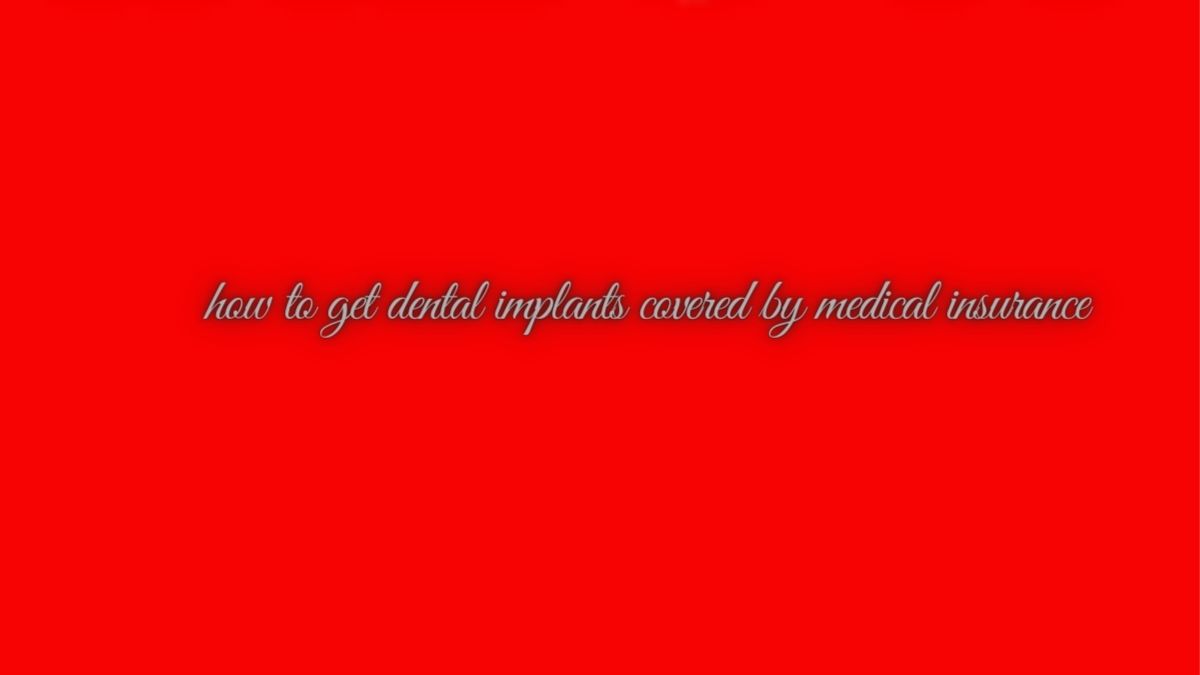
- toon
- 0 Comment(s)
how to get dental implants covered by medical insurance
Dental implants are a popular and effective result for replacing missing teeth. still, the cost of dental implants can be substantial, leading numerous individuals to explore options for content through their medical insurance. While dental insurance frequently covers routine procedures, similar to cleanings and paddings, content for dental implants under medical insurance can be more complex. This composition aims to give guidance on how to navigate the process of getting dental implants covered by medical insurance.
Understanding Dental Implants and Medical medical insurance Coverage
Before probing into the process of securing content, it’s essential to understand the basics of dental implants and how they relate to medical insurance. Dental implants are prosthetic teeth that are surgically implanted into the jawbone to replace missing teeth. Unlike traditional dentures or islands, dental implants offer an endless and natural-looking result for tooth loss.
Determining Eligibility for Coverage
Being Medical Conditions One factor that can impact the content of dental implants is the presence of existing medical conditions. Some medical insurance plans may have rejections or limitations regarding content for certain procedures, especially if they’re considered optional or ornamental. Individuals with underpinning medical conditions should precisely review their insurance programs to determine if dental implant surgery is covered. Insurance Plans and Programs Coverage for dental implants can vary significantly depending on the specific insurance plan and policy. While some insurance plans may offer comprehensive content for dental implants, others may give limited or no content at all. It’s essential to review the terms of your insurance policy and understand what procedures are covered under your plan.
Navigating Insurance medical insurance Coverage
Probing insurance programs Before pursuing dental implant surgery, it’s pivotal to probe your insurance policy to understand what procedures are covered and what conditions need to be met for content eligibility. This may involve reviewing your policy documents or reaching your insurance provider directly for an explanation. Inquiring with Insurance Providers still, do not vacillate to reach out to your insurance provider for guidance If you are doubtful about your content for dental implants. They can give information on content options, eligibility conditions, and any necessary way you need to take to secure content for dental implant surgery.
Exploring Indispensable Financing Options
Dental Financing Programs In cases where medical insurance doesn’t cover dental implants or only provides partial content, there are indispensable backing options available. numerous dental services offer backing programs or payment plans that allow cases to spread out the cost of treatment over time, making it more affordable. Health Savings Accounts( HSAs) and Flexible Spending Accounts( FSAs) Another option for financing dental implant surgery is to use finances from a health savings regard( HSA) or flexible spending account( FSA). These accounts allow individuals to set aside pre-tax bones for medical charges, including dental procedures not covered by insurance.
Seeking backing from Dental Professionals
Consultation with Dentists Before pacing with dental implant surgery, it’s essential to consult with a good dentist or oral surgeon to assess your eligibility for treatment. They can estimate your oral health, and bandy treatment options, and give guidance on navigating the insurance content process. Collaboration with Insurance Specialists In cases where insurance content for dental implants is uncertain, consider seeking backing from insurance specialists who can help you understand your policy, navigate the claims process, and endorse on your behalf with insurance providers.
Preparing Documentation and Claims
Gathering Medical Records To support your claim for dental implant content, it’s essential to gather applicable medical records, including attestation of tooth loss, oral health history, and any pre-existing conditions that may impact content eligibility. Completing Claim Forms Once you’ve gathered the necessary attestation, work with your dentist or oral surgeon to complete any needed claim forms directly and completely. furnishing detailed information and supporting attestation can ameliorate the liability of blessing for content.
Tips for Maximizing medical insurance Coverage
Understanding Policy Limitations Be sure to familiarize yourself with any limitations or rejections outlined in your insurance policy regarding content for dental implants. Understanding these limitations can help you make informed opinions about your treatment options and fiscal planning. Negotiating with Providers still, consider negotiating with your dental provider to explore indispensable treatment options or payment arrangements, If your insurance content for dental implants is limited. Some providers may offer abatements or flexible payment plans to help make treatment more affordable.
Conclusion
Securing content for dental implants through medical insurance can be a complex process, but with careful planning and advocacy, it’s possible to navigate the system successfully. By understanding your insurance policy, exploring indispensable backing options, seeking guidance from dental professionals, and preparing thorough attestation, you can increase your chances of getting dental implants covered by medical insurance.
FAQs
Are dental implants generally covered by medical insurance?
Coverage for dental implants varies depending on the individual insurance policy. Some plans may offer comprehensive content, while others may give limited or no content at all.
How long does it generally take to get dental implants covered by insurance?
The timeline for securing content for dental implants can vary depending on the insurance provider and the complexity of the claims process. In some cases, the blessing may be attained fairly snappily, while in others, it may bear fresh attestation or review.
Can pre-existing conditions affect the content of dental implants?
Pre-existing medical conditions can impact content for dental implants, as some insurance plans may have rejections or limitations regarding content for certain procedures. It’s essential to review your insurance policy and consult with your provider to understand how-existing conditions may affect content eligibility.
Are there any specific insurance plans that generally cover dental implants?
While content for dental implants can vary among insurance plans, some programs may offer further comprehensive content for certain procedures. It’s essential to probe your insurance options and select a plan that aligns with your dental health requirements.
What should I do if my insurance denies content for dental implants?
still, explore indispensable backing options, similar to dental backing programs or health savings accounts, If your insurance denies content for dental implants. You can also consider appealing the decision or seeking backing from insurance specialists to advocate on your behalf.




